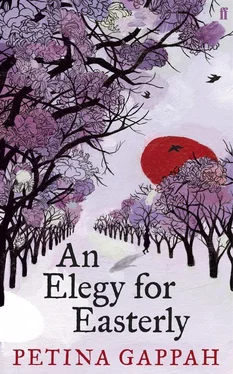Petina Gappah - An Elegy for Easterly
Здесь есть возможность читать онлайн «Petina Gappah - An Elegy for Easterly» весь текст электронной книги совершенно бесплатно (целиком полную версию без сокращений). В некоторых случаях можно слушать аудио, скачать через торрент в формате fb2 и присутствует краткое содержание. Год выпуска: 2009, Издательство: Faber & Faber, Жанр: Современная проза, на английском языке. Описание произведения, (предисловие) а так же отзывы посетителей доступны на портале библиотеки ЛибКат.
- Название:An Elegy for Easterly
- Автор:
- Издательство:Faber & Faber
- Жанр:
- Год:2009
- ISBN:нет данных
- Рейтинг книги:4 / 5. Голосов: 1
-
Избранное:Добавить в избранное
- Отзывы:
-
Ваша оценка:
- 80
- 1
- 2
- 3
- 4
- 5
An Elegy for Easterly: краткое содержание, описание и аннотация
Предлагаем к чтению аннотацию, описание, краткое содержание или предисловие (зависит от того, что написал сам автор книги «An Elegy for Easterly»). Если вы не нашли необходимую информацию о книге — напишите в комментариях, мы постараемся отыскать её.
An Elegy for Easterly — читать онлайн бесплатно полную книгу (весь текст) целиком
Ниже представлен текст книги, разбитый по страницам. Система сохранения места последней прочитанной страницы, позволяет с удобством читать онлайн бесплатно книгу «An Elegy for Easterly», без необходимости каждый раз заново искать на чём Вы остановились. Поставьте закладку, и сможете в любой момент перейти на страницу, на которой закончили чтение.
Интервал:
Закладка:
‘I had them all,’ she said as she pulled Rambanai further between her legs so that she could reach the other side of her head. ‘There was one businessman, you know the one, uyu we tobacco, he had such pink lips you could tell he was sick, but always he said I am an old madhala, no disease . But I never went with him which is just as well, handiti you know how he died?’
She had us in stitches as she told us how our Minister of Home Affairs had found her in bed with one of the assistant secretaries in the Foreign Affairs Ministry and the latter had almost lost an eye. ‘Once they have been here,’ she said, and patted her crotch, ‘they do not, they cannot go back.’
‘ Pakasungwa neutare ,’ the women said, and laughed as they clapped hands to each other. Manyara ignored this comment about the iron clasp of her loins and said, ‘But these days, ndinofamba naJesu . I walk with the Lord now, and all that is behind me. There is no mountain that he cannot move, no task that is too big for him, for nothing is impossible with Jesus.’
She spoke into the silence that followed this sudden change in subject and said, ‘But, takambofara vasikana .’ This recollection of happy times launched her into another tale in which the starring role went to the Governor of the Central Bank and his male appendage which, if Manyara was to be believed, was inversely proportional to the length of his monetary policy statements.
The laughter of the finishing women rang out in the afternoon. Naturally merry, Rambanai made them merrier still when she bought them Shake-Shake, the thick traditional beer that I associated with gardeners, miners and other labourers who could not always afford clear beer. I had only seen men drink Shake-Shake, drinking from a shared container in little knots, wiping mouths with the backs of their hands after taking long drags. Shake-Shake was an essentially male drink, I thought, so I was shocked to see women drink it. Rambanai drank too, but I did not like the taste. Manyara diluted the beer with a sweet Cherry Plum soft drink for me, and soon, I was giggling with Rambanai and everyone else. We stayed in Mbare for hours even after Rambanai had finished getting her hair done. Before we left, Manyara said to Rambanai, ‘I have a cousin-brother who is willing to do anything, please help him if you can,’ and Rambanai gave Manyara her number in America and said she would definitely see what she could do.
When we arrived home, my mother shouted and said we should not be walking around at night because people would think we were prostitutes. ‘ Pakasungwa neutare ,’ Rambanai said and patted her crotch, and I laughed until I felt sick and had to run to the bathroom to eject the masticated purplish mess of Shake-Shake and Cherry Plum.
We walked in all the markets of Harare buying curios and small soapstone sculptures. ‘I will have to get a bigger suitcase,’ Rambanai said. ‘Maybe I will leave these wooden bowls behind and take mainly the stuff from the Trading Company. Oh, and the stuff from Mbare too.’
Our housemaid Sisi Dessy worshipped Rambanai and could not get enough of her stories. ‘America is the land of opportunity, Sisi Dessy,’ Rambanai told her. ‘There you can be anything you want, anything at all. Someone like you can be a housemaid today, and before you know it, you have your own TV show.’
‘ Musadaro ,’ Sisi Dessy said in admiration.
‘It is true,’ Rambanai said. ‘You can be anything at all.’
It was true that Rambanai had developed in areas we had not expected. ‘She works for an insurance broker in Dallas, Texas,’ I said as I introduced her to my friend Sheila.
‘I am also dancer,’ Rambanai said.
‘But I thought you worked in an office,’ said Sheila.
‘I also dance.’
‘You mean, like a hobby?’ asked Sheila.
‘No, it is what I am.’
‘So you work in an office and you dance?’
‘I am also a poet.’
‘Wow,’ said Sheila, and I could see myself going up in her estimation, ‘do you have a book, or are you published in magazines?’
‘No, not yet, but I am working on it.’
There was silence.
‘What about the dance, are you part of a company or some kind of performing group or troupe, you know, like Tumbuka or anything like that?’
‘I am working on that too,’ said Rambanai. ‘I go to a studio four times a week. I will take up flamenco as soon as I get back.’
I overheard Sisi Dessy telling her friend Memory the housemaid from next door that in America you could be anything at all that you wanted, you could be a dancer, and a poet all at the same time as you worked in an office. ‘If I was in America,’ Sisi Dessy said, ‘I would have my own TV show by now.’
‘ Musadaro ,’ said Memory.
‘It is true,’ Sisi Dessy said with authority. ‘In America, you can be anything you want, anything at all.’

Rambanai stayed so long after the funeral that she was in the crowd of women dressed decorously in colourful Zambia wrappers that sat around the living room when Jimmy’s family approached my family to pay the bride wealth for me so that Jimmy and I could be married in the traditional way. At the end of the evening, tempers flared because Jimmy’s family thought that my family had been too hard on them.
‘This is what you get for marrying a Karanga woman,’ Jimmy’s friend Tichaona said to him. ‘You know they are the most expensive women in the country.’ But the thing was done, the balance that could not be given on the night of the marriage would be paid over time, Jimmy and I were married, what remained only was the white wedding.
I could live with Jimmy now, and we moved to our new flat in the Avenues, at the corner of Josiah Chinamano and Third Avenue. Rambanai spent all her time with us, and slowly moved her things in, the tight-tight pink tops and the low-rise jeans, the poncho that she said was cerise but which Jimmy said was bright pink, she moved them in one by one until it seemed almost natural that Jimmy and I should live with her.
‘It is convenient here,’ she said, ‘so close to town.’
‘Not so convenient when you are just married and all you want to do to your wife is to …’ Jimmy said, and I put my hand over his mouth and laughed.
When Rambanai was not with me, she crisscrossed Harare in search of the favourite places from her past. She often came back distraught. ‘Can you believe this?’ she said upon her return from one such excursion.
I looked up from my magazine, startled to hear the heartbreak in her voice.
‘There are flies at the Italian Bakery. Flies, imagine. I was so upset; I could not touch a thing . How is it possible that there are so many flies ?’
It did not seem to me that the fly population of Zimbabwe had increased exponentially since Rambanai’s departure. I was about to say something when she continued, ‘I went past Avondale Bookshop; it is a stationery shop now. Can you believe they have closed Weng Fu’s? He had the best spring rolls.’
It seemed to her a personal affront that Weng Fu had gone broke, as though he had done so deliberately to spite her. And it was not only Weng Fu’s. The sight of a flea market where there had been a restaurant or ice-cream parlour produced wails of dismay.
‘Oh my God, what happened to Ximex Mall?’ she said. ‘They had the best ice cream there. Remember the time I wore that pink top from Edgars with my white jeans from Truworths and my friend Mandi and I met those guys from Saints? No, hang on, they were from Falcon. We had lunch at that restaurant just inside Ximex, on the side of the Post Office and I had the best chicken and apple open sandwiches. There’s only that awful crap from China in Ximex Mall now, no restaurants, nothing.’
Читать дальшеИнтервал:
Закладка:
Похожие книги на «An Elegy for Easterly»
Представляем Вашему вниманию похожие книги на «An Elegy for Easterly» списком для выбора. Мы отобрали схожую по названию и смыслу литературу в надежде предоставить читателям больше вариантов отыскать новые, интересные, ещё непрочитанные произведения.
Обсуждение, отзывы о книге «An Elegy for Easterly» и просто собственные мнения читателей. Оставьте ваши комментарии, напишите, что Вы думаете о произведении, его смысле или главных героях. Укажите что конкретно понравилось, а что нет, и почему Вы так считаете.












